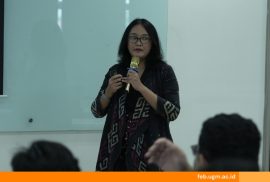The 2020 National Public Accountability Seminar (SNAP) was successfully held on (25/09/2020) with the theme “The Role of Audit in Improving the Quality of Public Accountability in the Middle of Change”. The seminar theme was discussed and reviewed interestingly by several speakers who presented the topic from various perspectives. The seminar was also well-guided by Dr. Dian Kartika Rahajeng, Lecturer at the Department of Accounting, FEB UGM, who acted as the moderator of the event. This national seminar was attended by hundreds of participants from varied backgrounds, from universities to government.
The first session was started by a speaker with governmental background, namely Prof. Dr. Mardiasmo, M.B.A., CFrA., QIA., Ak., CA., FCMA., CGMA., ASEAN CPA., CPA (Aust.)., CSFA. Prof. Dr. Mardiasmo is the Chairman of the Tax Supervisory Committee at the Indonesian Ministry of Finance and also serves as the Honorary Code of Ethics Council of the Audit Board of the Republic of Indonesia (BPK RI). Regarding the theme of the seminar, Prof. Mardiasmo said that the current BPK tagline is “Accountability for All”. The tagline acts as it supports BPK’s new breakthrough to be present and contribute to the country, especially in facing the challenges during the Covid-19 pandemic.
During this pandemic, the government has launched the Covid-19 Handling Program and also the National Economic Recovery Program, which is budgeted at Rp 695 T. It is BPK’s duty to examine and audit the program. Therefore, BPK is now planning a Long Form Audit Report (LFAR) which is in line with international audit boards’s target; BPK is not only present to give opinions but also generate recommendations by taking into account the aspects of equity and equality for all Indonesian people.
According to Prof. Mardiasmo, BPK needs to do what is called a performance audit, not just a financial audit. For the public sector environment, this is a new financial reporting mechanism with programs that reach all levels of society. “Because later BPK will also conduct a performance audit in addition to general audit, BPK should not step into the so-called self review trend because that is the domain of internal auditors.” said Prof. Mardiasmo who also instructed the BPK to always be independent and objective.
The second session was delivered by a speaker with an academic background, Prof. Dr. Abdul Halim, M.B.A., Ak., CA., who is a Professor of FEB UGM as well as the Chair of FEB UGM Master of Accounting Study Program. On this occasion, Prof. Abdul Halim discussed the material titled as “Accounting and Auditing Challenges and Responses in Improving the Quality of Public Accountability” regarding an academic perspective on corruption/fraud. According to Prof. Abdul Halim, accountability can be interpreted as the obligation of a person entrusted with a duty to others to explain his/her performance of that duty. “Accounting is a form of public accountability, transparency, and predictability of organizational performance.”, said Prof. Abdul Halim, who explained accounting as a means of public accountability itself.
Based on what Prof. Abdul Halim explained, the core of public accounting focuses on public organizations or entities such as government. The coveted public financial management is transparent and accountable. Prof. Abdul Halim argued that a person who is proficient in accounting is faced with two choices whether he becomes a controller who controls the organization or becomes a corruptor of the organization by making fraud. Acts of corruption are an abuse of public power for personal gain, so in order to increase accountability one must also simultaneously reduce the level of corruption.
Public accountability is a matter of trust and confidence. “The response that we (academics) should do is to design and manifest an environment for accounting education, especially auditing, that ensures integrity.” said Prof. Abdul Halim as he closed the session.
Still in line with the same topic, Dr. Pahala Nainggolan, CA., Deputy for Prevention of KPK RI, was present as a speaker in the third session with material titled as “Public Sector Accounting and Corruption Prevention”. What differs from the previous session, the topic is discussed through the perspective of a speaker who directly experienced and witnessed all the facts in the field. According to Dr. Pahala, accountants contribute in escalating public accountability, but unfortunately the need for adequate human resources (having an accounting background) in the government is still far from the target, making it difficult to encourage accountability. “Come on, those of you from the university, let’s work together to help regional accountability!” invited Dr. Pahala to the seminar participants.
In addition, Dr. Pahala also explained a number of problems that are indicated to have a high risk of corruption, including the presentation of national assets, recognition/claim of regional assets, and recognition/claim of regional revenues. “There are various forms of corruption, but all of them lead to state losses. This problem can be prevented by better governance through asset management in which public accountants can greatly contribute.”, he added.
In the last session, the topic of material with the title “Quality of Audit in the Context of Increasing the Quality of Accountability” was presented by Dr. Agus Joko Pramono, S.ST., M.Acc., CA., CPA., CSFA, who serves as the Deputy Chairman of BPK RI. In this session, Dr. Agus discussed four areas of discussion. The first area is the concept of state finance, the scope of which includes almost all business processes in Indonesia from the APBN and its derivatives. Then, Dr. Agus discussed state financial accountability which consists of three pillars, namely accounting standards, financial reporting, and financial audits.
The third area of discussion relates to audits of state finances conducted by BPK on government financial reports and performance audits. The last area of discussions regarding the quality management of inspection, Dr. Agus explained the use of the SAI Performance Measurement Framework which consists of six domains. “The expectation is that if all aspects can be carried out well, the quality of accountability in Indonesia will be better.”, he concluded. The event of the 2020 National Public Accountability (SNAP) seminar ended with a Q&A session that the participants had previously asked in the question box and answered by all of the speakers of the seminar.
Reportage: Kirana Lalita Pristy/Sony Budiarso.




